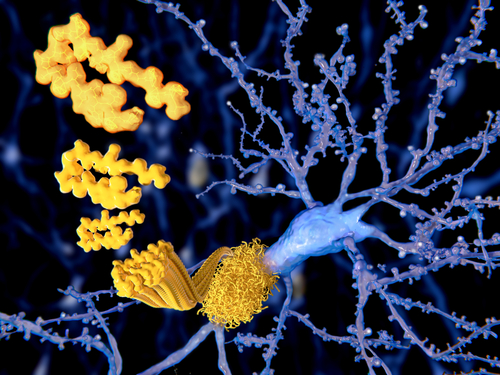Investigational Therapy BAN2401 Slows Alzheimer’s Progression Over 18 Months, Phase 2 Results Show

Treatment with investigational compound BAN2401 over 18 months reduced the accumulation of amyloid fibers in the brain and slowed Alzheimer’s disease progression, according to top-line results from a Phase 2 trial.
This follows a previous announcement in December 2017 by Eisai and Biogen, the therapy’s developers, that the treatment had failed to promote significant changes after 12 months. After these initial disappointing results, an independent trial review committee declared the data was inconclusive, and researchers extended the trial for an additional six months.
“The prospect of being able to offer meaningful disease-modifying therapies to individuals suffering from this terrible disease is both exciting and humbling,” Alfred Sandrock, MD, PhD, executive vice president and chief medical officer at Biogen, said in a press release. “These BAN2401 18-month data offer important insights in the investigation of potential treatment options for patients with Alzheimer’s disease and underscores that neurodegenerative diseases may not be as intractable as they once seemed.”
BAN2401 is an engineered antibody that specifically binds and neutralizes toxic amyloid aggregates — thought to contribute to the neurodegenerative process in Alzheimer’s disease.
Study 201 (NCT01767311) is a randomized, double-blind, placebo-controlled Phase 2 trial that evaluated BAN2401’s effectiveness and safety. The study enrolled 856 patients with early Alzheimer’s disease who were randomly assigned to receive one of five treatment regimens with the investigational antibody — 2.5, 5, or 10 mg/kg biweekly, 5 or 10 mg/kg monthly — or a placebo.
During the 18 months of treatment, BAN2401 showed an acceptable tolerability and safety profile. The most common adverse events reported were mild to moderate infusion-related reactions and amyloid-related imaging abnormalities (ARIA), which are atypical differences seen in the neuroimaging of Alzheimer’s patients often associated with amyloid-modifying therapies.
Patients treated with the 10 mg/kg biweekly regimen for 18 months, the highest dose of BAN2401 tested, had significantly slower disease progression than the placebo group. Imaging analysis of the brain by positron emission tomography (PET) scans revealed these individuals also had significantly lower amounts of amyloid aggregates.
“This is the first late-stage anti-amyloid antibody study to successfully achieve statistically significant results at 18 months,” said Lynn Kramer, MD, chief clinical officer and chief medical officer of the Neurology Business Group at Eisai. “We will discuss these very encouraging results with regulatory authorities to determine the best path forward. We continue to work towards the goal of delivering BAN2401 to patients and healthcare professionals as early as possible.”
Although preliminary analysis failed to demonstrate the early effectiveness of the treatment, a more detailed evaluation revealed dose-dependent changes from the beginning of treatment across PET results and clinical objectives. Additionally, treatment with 10 mg/kg BAN2401 biweekly led to clinical benefits, as measured by the Alzheimer’s Disease Composite Score (ADCOMS), as early as six months.
“The 18-month results of the BAN2401 trial are impressive and provide important support for the amyloid hypothesis,” said Jeff Cummings, MD, founding director of the Cleveland Clinic’s Lou Ruvo Center for Brain Health. “I look forward to seeing the full data set shared with the broader Alzheimer’s community as we advance against this devastating disease.”
The companies are planning to disclose detailed information on the trial results at upcoming medical conferences.






